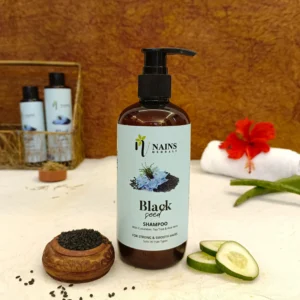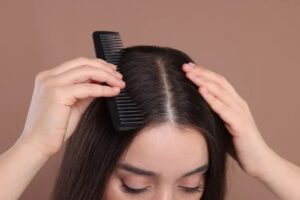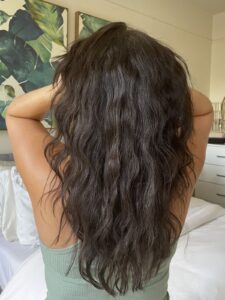How Often Should You Really Wash Your Hair?
Introduction: The Great Hair-Wash Debate
- Why it feels right for some people to wash every day while others only do it once a week. Let’s dispel the myths and determine what is best for your scalp and hair.
- How often should you wash your hair The subject of how frequently to wash your hair is one that causes a great deal of uncertainty when it comes to hair maintenance.
- Some people view it as a crucial and revitalising daily habit.
- Others experience it once a week, or perhaps more frequently. Interestingly, both groups may be correct.
- Since there is no one-size-fits-all method for washing hair, the answer isn’t universal. Your lifestyle, surroundings, hair texture, scalp type, and even the products you use all have a role.
- In this article, we’ll discuss why there isn’t a clear solution and how to find a hair-washing regimen that promotes rather than harms the health of your hair.

- For hair tips, people frequently consult friends, Google, or influencers. While some people swear by washing once a week to retain natural oils, others may claim, “I can’t go a day without washing or my scalp feels oily.”
- The wide variations in hair kinds are the cause of this misconception.
- Compared to someone with thick, curly hair, someone with fine, straight hair could experience oil buildup more quickly.
- Lifestyle is also important; if you live in a humid area or exercise regularly, you may need to wash your hair more frequently.
- It is more beneficial to pay attention to your own scalp and hair than to adopt someone else’s practice.
- According to trichologists, specialists in hair and scalp care, excessive washing can remove the natural oils that shield hair, resulting in dryness, frizz, or irritation of the scalp.
- On the other hand, dandruff, a heavy scalp, and plugged follicles can result from underwashing. The objective is to keep the scalp environment balanced and clean.
- Dermatologists advise that most people should wash two to three times per week.
- Conditions such as seborrhoeic dermatitis, which may necessitate the use of medicated shampoos more frequently, or severely dry hair types, which benefit from longer intervals between washes, might cause variations in this.
- Hair cleaning was never a daily ritual in many civilisations. For instance, traditional Ayurvedic hair washes used herbal oils and powders once or twice a week.
- On the other hand, daily shampooing became commonplace in Western regimens, particularly with the advent of aggressive advertising in the 20th century.
- Even dermatologists are now re-examining the “less is more” philosophy in relation to hair care.
- To encourage better washing practices, brands increasingly advertise co-washing, sulfate-free shampoos, and formulas that are kind to the scalp.
- Instead of scraping the scalp every day, the focus is now on respecting the microbiome.
- What is the lesson, then? Don’t let trends influence you alone. Observe the sensation of your scalp.
- By Day 2, does it feel oily, smell, or itch? You may need to wash as a result.
- After every day of washing, is your hair frizzy or brittle?
- It’s an indication that you’re going overboard. Additionally, you can modify your routine according to the season, washing more in the summer or monsoon and less in the winter.
- It makes a huge difference to use the shampoo that is best for your hair type and scalp condition. You can rely on your hair to communicate its demands.
1.Understand Your Scalp Type First
- The frequency of shampooing is determined by your scalp rather than your hair.
- Your scalp, not your hair, is the true deciding factor when it comes to hair washing.
- Consider your scalp to be the base of healthy hair. Knowing your scalp type is essential to creating a successful hair wash routine, much as we take skin type into account when selecting a face cleanser.
- The purpose of shampoo is to cleanse the scalp by eliminating dead skin cells, perspiration, product accumulation, and excess oil.
- You may be doing more harm than good if you’re concentrating solely on the hair strands and neglecting the scalp.

- You probably have an oily scalp if, towards the end of the day or early the next morning, your roots feel greasy.
- This is frequently brought on by overactive sebaceous (oil) glands, which can be brought on by hormones, humidity, or heredity.
- Dust and other pollutants are drawn to oily scalps, blocking follicles and perhaps causing dandruff or acne.
- Expert Advice: Select a gentle shampoo without sulphates that contains clarifying herbs like rosemary, neem, or tea tree.
- Steer clear of thick conditioners for the scalp. Washing the scalp every 1-2 days keeps it clean and helps avoid accumulation.
- A dry scalp feels tight, itchy, and may show white flakes—often mistaken for dandruff. Unlike oily flakes, these are dry and powdery.
- Washing too frequently strips away natural oils, making the condition worse.
- Expert Tip: Use moisturizing shampoos with ingredients like aloe vera, glycerin, or coconut milk. Limit hot water use and avoid daily shampooing.
- Stick to washing 2–3 times a week with a hydrating hair care routine.
- You probably have an oily scalp if, towards the end of the day or early the next morning, your roots feel greasy.
- This is frequently brought on by overactive sebaceous (oil) glands, which can be brought on by hormones, humidity, or heredity.
- Dust and other pollutants are drawn to oily scalps, blocking follicles and perhaps causing dandruff or acne.
- Expert Advice: Select a gentle shampoo without sulphates that contains clarifying herbs like rosemary, neem, or tea tree.
- Steer clear of thick conditioners for the scalp. Washing the scalp every 1-2 days keeps it clean and helps avoid accumulation.
- Your scalp is probably sensitive if it reacts quickly, burning, stinging, or flaking. Routine washing might be difficult for people with psoriasis, seborrhoeic dermatitis, or eczema.
- Expert Tip: Use shampoos made for sensitive skin that have been dermatologist-tested or made with herbs. Calendula, chamomile, and salicylic acid (in medicated forms) are among the ingredients that are proven to reduce inflammation.
- Avoid overwashing; two to three times a week is usually adequate. Always use a mild, soothing scalp oil or serum afterward.
2. Know Your Hair Type & Texture
- Your hair type and texture serve as the supporting cast, while your scalp type serves as the basis for your hair wash regimen.
- Your hair’s texture has an impact on how rapidly oil moves through its strands, how much moisture it holds, and how frequently it feels or appears unclean.
- Knowing the natural pattern of your hair—whether it’s coily, curly, wavy, or straight—will help you customise your washing schedule and prevent product accumulation or over-cleaning.
- To put it briefly, the way your hair reacts to wash, water, oil, and humidity depends on its texture.

- Have you ever wondered why your straight hair looks oily by Day 2 while your buddy washes her curly hair once a week?
- Texture is at play there. One thing is evident from real-world experiences with various hair types: what suits one hair texture may not suit another.
- Although social media may exalt “hair wash day” rituals, the demands of your hair, not fashion, should determine how frequently you lather up.
- The smoothest shaft and least amount of natural texture are found in fine, straight hair.
- This facilitates the faster movement of natural scalp oils through the hair strands.
- The outcome? Within 24 to 48 hours, hair that seems flat, oily, or limp—even if the scalp isn’t overproducing oil.
- Expert Tip: Pay attention to scalp care and wash every 1-2 days.
- To get rid of extra oil without making your hair feel heavy, use a volumising or light clarifying shampoo.
- If you want to space out your wash days, using dry shampoo in between washes can be beneficial.
- Because curly and wavy hair has more twists and turns, natural oils have a tougher time getting to the ends.
- Additionally, these textures are typically more porous, meaning that moisture is readily absorbed and lost. They may grow brittle, frizzy, or dry if overwashed.
- Expert Tip: For most people with curly or wavy hair, washing should be done every three to four days.
- Choose moisturising shampoos without sulphates that contain nourishing components like flaxseed extract, shea butter, or argan oil.
- To keep your hair hydrated and soft, use a leave-in conditioner.
- The hardest hair textures to distribute scalp oils throughout the strands are those that are tightly coiled or kinky, which are frequently classified as Type 4 in curl charts.
- This makes this type of hair inherently drier and more delicate. Overwashing can remove the few natural oils that are there, which can cause breakage or sensitive scalps.
- Expert Tip: A “low-poo” or “no-poo” routine is ideal for kinky or coily hair. It is preferable to wash with a mild, moisturising cleanser (or cleaning conditioner) once a week or every ten days.
- The hair shaft can be protected by prepooing with oil before shampooing. Additionally, protective styles and deep conditioning aid in moisture retention.
- Expert hairstylists concur that method is determined by texture. Respecting curl patterns and moisture levels is crucial, according to celebrity curl gurus like Lorraine Massey, the inventor of the Curly Girl Method.
- Maintaining bounce and firmness requires understanding how often to wash—and with what—whether you’re working with highly textured coils or embracing your natural waves.
- Rather than forcing your hair into a routine that suits someone else’s texture, trust what your own strands tell you.
- If your hair feels dry, tangled, or breaks easily, you’re likely over-washing. If it feels greasy, heavy, or limp, you might need more frequent cleansing.
- Seasonal changes, styling tools, and chemical treatments can also influence how often your hair needs to be washed.
- Listen to your hair’s texture—it speaks volumes.
3. Lifestyle Matters More Than You Think
- Your lifestyle is a significant component that is frequently disregarded, even if you have perfected your scalp type and hair texture.
- Your everyday activities, surroundings, and hair care regimen can all have a big impact on how frequently your scalp and hair need to be cleansed.
- Exercise, urban pollution, and heavy styling products are some examples of real-world factors that might cause your hair to become oilier or dirtier more quickly than you may expect.
- In actuality, your washing schedule ought to be flexible enough to accommodate your daily routine.

- Your hair is continuously exposed to fine dust, smoke, and other pollutants whether you live in a city or drive every day.
- These particles land on your hair and scalp, causing buildup and retaining oil. Your scalp may suffer even if your hair appears clean.
- Expert Tip: Think about washing every two to three days with a mild yet clarifying shampoo that contains neem, green tea, or activated charcoal.
- Use a scalp exfoliator once a week to thoroughly clean the follicles, and cover your hair with a hat or scarf when you’re outside to minimise exposure.
- Regular use of mousse, hairspray, dry shampoo, or gel can cause residue to accumulate on your hair shafts and scalp.
- If not thoroughly cleansed, this can make your hair feel heavy, lose its shine, and even irritate your scalp or clog your follicles.
- Expert Tip: If you use styling products on a daily basis, wash more often. Choose shampoos that are mild on the scalp but have the term “clarifying” on the package.
- Give your hair a few days without using any treatments and refrain from putting too many layers on in between washes.
- Prominent trichologists and dermatologists frequently stress how crucial it is to modify your washing routine in response to outside circumstances.
- If your lifestyle requires it, washing more frequently isn’t “dirty” as long as you use a mild shampoo. Additionally, cleaning less frequently can be adequate if your schedule is primarily indoors or sedentary.
4. The Risk of Overwashing
- The saying “clean hair is healthy hair” is frequently used, but there’s a catch: excessive cleaning can actually damage your scalp and hair.
- One of the most frequent, yet often disregarded, causes of dryness, frizz, breakage, and even inflammation of the scalp is overwashing.
- Although having a clean scalp is crucial, scraping away natural oils on a daily basis can upset the delicate balance of your scalp and eventually harm your hair.
- Overwashing your face removes natural oil, and the same harsh treatment is applied to your scalp.

- The saying “clean hair is healthy hair” is frequently used, but there’s a catch: excessive cleaning can actually damage your scalp and hair.
- One of the most frequent, yet often disregarded, causes of dryness, frizz, breakage, and even inflammation of the scalp is overwashing.
- Although having a clean scalp is crucial, scraping away natural oils on a daily basis can upset the delicate balance of your scalp and eventually harm your hair.
- Overwashing your face removes natural oil, and the same harsh treatment is applied to your scalp.
- Many individuals think they should wash their hair daily, particularly if they live in a hot area or their hair gets greasy easily.
- However, many are unaware that excessive washing might lead to a damaging cycle. Your scalp overcompensates by creating more oil the more you remove its natural oils.
- Oily roots and dry, brittle ends result from this, which leads to even more frequent washings and so on. Over-cleaning has been linked to numerous reports of abrupt hair loss, flakiness, and discomfort in the scalp.
- Sebum is a naturally occurring oil produced by the scalp that lubricates and protects the hair shaft.
- Overwashing removes this protective layer, especially when using harsh or sulfate-based shampoos. The outcome? Squeaky-clean hair that soon turns unruly, dry, and lifeless.
- Expert Advice: Let your natural oils take care of themselves.
- Instead of shampooing your hair more frequently, try using a moderate, balanced shampoo if it seems overly oily.
- The enemy is uneven care, not oil.
- Due to its decreased elasticity, dry hair is more prone to breakage and split ends. Frizz, too? Your hair is begging for hydration.
- The lipids that make your hair silky and pliable are eliminated by excessive washing.
- Additionally, if you don’t have enough oils on your scalp, it may begin to flake—not because of yeast that causes dandruff, but rather because of excessive dryness.
- Expert Tip: If you already have dry or curly hair, or if it’s cooler outside, wash less frequently. To restore moisture, use a leave-in conditioner and deep conditioning masks once a week.
- Every ten to fifteen days, you might also benefit from a scalp oil treatment.
- Excessive cleaning might cause inflammation beneath the surface as well.
- Overwashing can cause redness, stinging, burning, or tiny pimples on sensitive scalps.
- You might be washing too frequently or using an excessively harsh shampoo if you experience tightness or discomfort after washing.
- Expert Advice: Use a pH-balanced shampoo that has calming components like oats, calendula, chamomile, or aloe vera.
- Wash your scalp no more than two or three times a week to allow it to adjust. See a dermatologist if symptoms don’t go away.
- Board-certified dermatologists claim that the scalp has its own microbiome, which is a naturally occurring ecosystem of oils and bacteria.
- The scalp’s barrier is weakened when this ecosystem is regularly removed, increasing the risk of infections, discomfort, and even hair thinning.
- Nowadays, hair stylists take “scalp care” just as seriously as they do skincare—cleaning just enough, but not too much.
- Red indicators include your scalp itching, flaking, or stinging after washing, as well as straw-like, frizzy, or breakable hair.
- Your scalp and hair are attempting to inform you that it’s not always ideal to use more shampoo. Observe how your hair reacts after taking a few days rest in between washing.
- Cutting back on your hair often results in healthier, glossier, and easier-to-manage hair.
5. What If You Wash Too Little?
- Minimal washing practices have become more and more popular in recent years.
- People are adopting the notion that less is more, as evidenced by the “no-poo” movement and curl-friendly routines. The catch is that less isn’t necessarily better.
- Underwashing has its own concerns, but overwashing can harm your hair and scalp.
- Unpleasant odours, irritation, clogged follicles, and dull-looking hair can result from accumulating debris, oil, product residue, and dead skin cells over an extended period of time without cleansing.
- It all comes down to striking the correct balance.

- Remainder is left on your scalp and hair after each use of dry shampoo, leave-in products, oils, serums, and styling sprays.
- If you don’t wash your scalp frequently, these layers build up and start to smother it. Product accumulation over time can result in blocked follicles, inflammation, dullness, and even slowed hair growth.
- Expert Tip: To reset your scalp, especially if you use a lot of hair products, use a clarifying shampoo once every two to three weeks.
- Choose lightweight, non-greasy style solutions that leave little residue if you’re extending the time between washes.
- The scalp will still produce sebum even if your hair texture doesn’t seem greasy at first.
- This oil weighs down your hair and gives it a lifeless, dirty, and flat appearance when it accumulates at the roots if you don’t wash it.
- Additionally, you may discover that your hairstyle is not permanent or that your scalp has a “off” scent.
- Expert Tip: Try washing your hair with plain water or using a scalp toner if your hair feels oily but you don’t want to shampoo it just yet.
- Use dry shampoo sparingly as a temporary solution in between washes, not as a substitute.
- Flakes can be formed by an accumulation of dead skin cells and are not usually an indication of dandruff.
- Because of inadequate circulation and product layering, an unclean scalp can become itchy, tight, and flaky.
- This may eventually impair the health of the scalp and result in problems like irritation or hair loss.
- Expert Tip: To get rid of dead skin and pollutants, use a mild exfoliating scalp scrub once a week. Keep an eye out for components like tea tree oil, apple cider vinegar, or salicylic acid.
- These assist balance the natural oil production on the scalp in addition to cleansing it.
FAQS
1. How often should I really wash my hair?
It depends on your scalp type, hair texture, and lifestyle. Oily scalps may need washing every 1–2 days, while dry or curly hair types can go 3–5 days or more. There’s no one-size-fits-all rule.
2. Can washing hair daily cause damage?
Yes—daily shampooing, especially with harsh, sulfate-based shampoos, can strip your scalp’s natural oils, leading to dryness, frizz, or irritation. If you feel the need to wash daily, use a mild, hydrating formula.
3. What happens if I don’t wash my hair often enough?
Skipping too many washes can lead to product buildup, greasy roots, itchy scalp, and even follicle blockage, which may affect hair growth. Listen to your scalp’s cues.
4. Is dry shampoo a good replacement for washing?
Dry shampoo can be a temporary solution to absorb oil and refresh hair, but it doesn’t clean the scalp. Overuse can lead to buildup and clogged pores. It’s best used between washes—not as a substitute.
5. Do I need to change my wash routine with the seasons?
Yes. In humid or sweaty months, your scalp may get oilier, requiring more frequent washing. In dry winters, reduce washes to prevent dehydration. Adjust your routine based on weather changes.
6. How do I know if I’m overwashing?
Signs include: itchy or tight scalp, dry ends, frizz, and rapid oil rebound. If your hair gets greasy soon after washing, you may be over-cleansing and triggering your scalp to produce more oil.
7. Can hair type (curly, straight, etc.) affect how often I should wash?
Absolutely. Straight/fine hair gets oily quickly, requiring more frequent washing. Curly or coily hair is naturally drier and can go longer between washes. Texture matters!
8. Should I shampoo after every workout?
Not always. If you sweat heavily, rinsing with water or co-washing can be enough. Shampooing 3–4 times a week is fine, but don’t overwash unless your scalp feels greasy or itchy.
9. Is it okay to only condition and skip shampoo sometimes?
Yes, especially for dry, curly, or coily hair. This technique, called co-washing, can help maintain moisture between regular shampoos. But make sure to deep cleanse at least once a week.
10. What’s the best way to transition to washing less often?
Gradually extend the days between washes by 1 day at a time. Use dry shampoo, herbal mists, and scalp massages to refresh your roots. Be patient—your scalp needs time to adjust.
